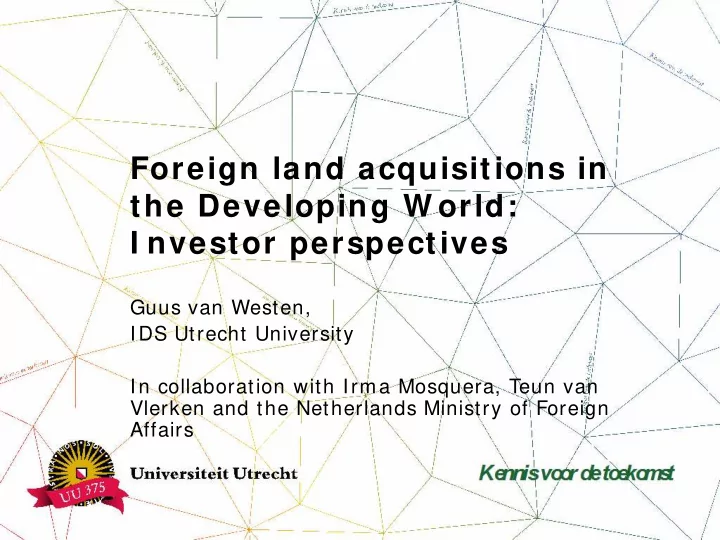

Foreign land acquisitions in the Developing W orld: I nvestor perspectives Guus van Westen, IDS Utrecht University In collaboration with Irma Mosquera, Teun van Vlerken and the Netherlands Ministry of Foreign Affairs
Situating investors • ‘Global land grab’: cross-border land acquisitions have become a hot issue • Inventories and research – focus on: • Size and scope of foreign land acquisitions • Reasons, drivers • Impact on existing users, local development • Relatively little on investors perspectives • Who they are: emerging data • Similar: where they invest • Motivation, views, concerns, opportunities and limitations • Investors are elusive yet important actors. Hence, attention warranted • What is their view on rights and responsibilities?
Tw ofold aim of this contribution • Regulatory framework guiding investor’s behaviour • Focus on the investors, get to know their perspectives on the issue: • What types of investor, how these affect impact on resources, development, … • Views, concerns, options and constraints • With a view of developing better governance tools for inclusive and sustainable development
1 . Regulatory fram ew ork, cross-border land acquisition • Foreignization of land is a logical component of globalization: resulting from 2-3 decades of liberalization and deregulation of land markets; successful structural adjustment • International governance: considerably changed since early 1990s, esp. within WTO framework • Liberalization of FDI flows, • non-discrimination principle promoting ‘level playing field’ • Reduced scope for host country conditionality
Regulatory fram ew ork ( 2 ) Less well documented: proposed focus of paper on: • Domestic reforms: more flexible and transparent rules in order to attract FDI – varies by country • Bilateral investment agreements (now some 2500); stabilization clauses applicable to foreign land acquisition – important tool for investor rights, foreign investment often better protected than domestic assets, - option to invoke other legislation in case of conflict
Actors in transnational land acquisition: stereotypes and beyond • Companies interested in using land for production purposes • May contribute in terms of technology, market access, productivity • May also lead to dislocation and exclusion of locals • Investors acquiring land as investment vehicle or for obtaining legal benefits • Less direct impact? – unless transfer interferes with use; speculative reserves • Indirect investors: funds holding equity in companies acquiring land in Developing Countries (investment funds, pension funds, etc.) • Disembedded stakeholders, but potentially powerful sources of standards, rules, c odes of conduct
I nvestor view s: prelim inary observations • A shift away from popular perceptions • Investor concerns (interviews): • Lack of security: weak institutions, incomplete legal frameworks and enforcement problems, variable authorities • Conditionality imposed by authorities, sometimes difficult to accommodate in business approach • Transaction costs and time frames - investors need returns on schedule, often an issue • Key role of local partners or middlemen to ‘make things happen’ – much foreign land acquisition depends on the presence of effective local intermediaries
Local com m unity expectations: a m atch? • Jobs, income: preferential access? • Contributions to tax base, infrastructure • Access to technology, markets • Blending into national/ local culture, lifestyles • Direct management by foreign investors or local management, outsourcing management contracts: does it matter?
Som e policy dim ensions to be explored? • Does productive investment in land depend on a considerable ‘embeddedness’ in host society? Without satisfactory involvement of local actors, sorting out of rights and responsibility vis a vis community/ state, good relations with local community, foreign investments are not likely to succeed beyond the short term • What institutionalization is needed? Good governance and institutions offer security to investors as well as the host community; Regulations on desirable types of investment/ use • What is the role (potential, limitations) of guidelines, codes of conduct, CSR?
Data sources • Review and analysis of legal/ regulatory documentation on cross-border investment in land (Irma Mosquera) • Review of existing sources on investors involved in land acquisitions in Global South • Survey among Dutch investors with land in Sub- Saharan Africa, from PSI programme (Min. Foreign Affairs) (Teun van Vlerken) • Follow-up interviews
Recommend
More recommend